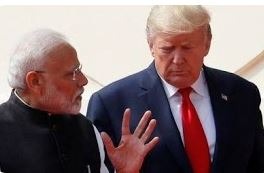‘India’s Biggest Enemy Lies Within’: PM Modi’s Subtle Remark Amid H-1B Visa Issues and Rising US Tariffs
During a recent address, Prime Minister Narendra Modi delivered a veiled statement, saying India’s “biggest enemy” comes from within, not outside the borders. The comment, made against the backdrop of H-1B visa uncertainties and rising US tariffs on Indian goods, has sparked conversations on India’s economic strategy, self-reliance, and global positioning.


By: Bharat Daily Samachar Date: 20 Sep,2025
A Veiled Statement That Stirred Debate
Prime Minister Narendra Modi is known for carefully crafted speeches, often filled with metaphors and subtle references. In his latest address, he stated, “India’s biggest enemy is not a foreign power, but the mindset that doubts our own capabilities.”
While he did not directly mention any country, the remark came at a time when Indian professionals in the United States are facing anxieties over H-1B visa restrictions, and New Delhi is grappling with the impact of US tariffs on critical export sectors.
This combination of global challenges and domestic skepticism, Modi suggested, is what India must overcome to secure its future.
H-1B Visa Concerns: A Threat to Indian Talent Abroad
For decades, H-1B visas have been a gateway for thousands of highly skilled Indian engineers, IT professionals, and researchers to work in the United States. Recent policy shifts, however, have led to uncertainty. Tighter rules, delays in processing, and stricter scrutiny have made it harder for Indian workers to secure or renew their visas.
The situation has triggered concerns for India, as the IT and software sector contributes significantly to the country’s economy and global reputation. Families of Indian professionals in the US fear disruption, while Indian firms that rely heavily on outsourcing face rising costs.
Analysts believe Modi’s remarks indirectly addressed this issue—urging India to reduce over-dependence on foreign opportunities and instead create more global-scale job avenues at home.
US Tariffs: A Blow to Indian Exporters
Adding to the worries is the imposition of fresh US tariffs on Indian goods, particularly in textiles, steel, and certain agricultural products. Washington argues the move is meant to protect domestic industries, but for India, it poses a setback just as the country is pushing to boost exports.
Indian exporters warn that tariffs make their products less competitive in the American market, leading to potential job losses and reduced income in sectors that employ millions.
Here, too, Modi’s emphasis on self-reliance comes into play. By calling internal doubt the “biggest enemy,” he is indirectly highlighting the need for India to innovate, upgrade its manufacturing standards, and expand trade with new markets instead of being overly dependent on one.
Self-Reliance as a Shield Against Global Pressures
The Prime Minister’s statement also ties into his long-standing vision of “Atmanirbhar Bharat” (Self-Reliant India). According to Modi, India’s true strength lies in its ability to trust its own capabilities, innovate locally, and turn challenges into opportunities.
He reminded citizens that while global partnerships are vital, India must build resilience from within to withstand external shocks like tariffs, visa restrictions, or geopolitical tensions.
Economists echo this view, suggesting that India should focus on strengthening its domestic industries, encouraging startups, and investing in research and development. By doing so, India can not only reduce vulnerability to foreign policies but also emerge as a stronger global player.
Reactions Across Political and Business Circles
Modi’s remark has triggered varied responses. Supporters see it as a call to shed negativity and embrace confidence in Indian potential. They argue that pessimism, bureaucracy, and resistance to reform are indeed the real enemies holding India back.
Critics, however, interpret the statement as a way of deflecting attention from pressing global concerns such as the job insecurity of Indian workers abroad and the real economic impact of tariffs. Opposition parties have asked for a stronger diplomatic push to safeguard Indian interests in the US rather than symbolic rhetoric.
Meanwhile, Indian industry leaders have welcomed the message but stressed that the government must support businesses with policy reforms, better infrastructure, and easier access to credit if self-reliance is to succeed in practice.
The Larger Message: Confidence in India’s Future
At its core, Modi’s message is not just about external challenges like the H-1B crisis or tariffs. It is about fostering a mindset that believes India can compete globally on its own terms. He emphasized that India must break free from the chains of self-doubt that have historically slowed progress.
His words resonate strongly with the youth, entrepreneurs, and innovators who see India as a rising hub for technology, green energy, and digital services. For them, the “enemy within” is indeed the hesitation to dream big and act boldly.
Conclusion: A Defining Moment for India’s Global Role
Prime Minister Modi’s subtle remark—“India’s biggest enemy is the mindset that doubts our own strength”—may have been veiled, but its message is loud and clear. As India navigates H-1B visa uncertainties and trade tensions with the US, the country is being reminded to look inward for strength.
Whether it’s building world-class IT hubs, boosting manufacturing, or promoting indigenous startups, the path forward lies in confidence and resilience.
The global stage is shifting rapidly, and India’s role will depend not just on diplomacy but also on how boldly it believes in its own abilities. Modi’s words, though cryptic, underline a truth that goes beyond politics—India’s future will be shaped less by external obstacles and more by how it conquers the doubts within.
